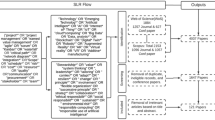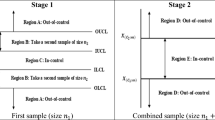Abstract
We propose a resource allocation model for project scheduling. Our model accommodates multiple resources and decision-dependent activity durations inspired by microeconomic theory. First, we elaborate a deterministic problem formulation. In a second stage, we enhance this model to account for uncertain problem parameters. Assuming that the first and second moments of these parameters are known, the stochastic model minimises an approximation of the value-at-risk of the project makespan. As a salient feature, our approach employs a scenario-free formulation which is based on normal approximations of the activity path durations. We extend our model to situations in which the moments of the random parameters are ambiguous and describe an iterative solution procedure. Extensive numerical results are provided.
Similar content being viewed by others
References
Alizadeh, F., & Goldfarb, D. (2003). Second-order cone programming. Mathematical Programming, 95(1), 3–51.
Artzner, P., Delbaen, F., Eber, J.-M., & Heath, D. (1999). Coherent measures of risk. Mathematical Finance, 9(3), 203–228.
Bazaraa, M. S., Sherali, H. D., & Shetty, C. M. (2006). Nonlinear programming—theory and algorithms (3rd ed.). New York: Wiley.
Ben-Tal, A., & Nemirovski, A. (1998). Robust convex optimization. Mathematics of Operations Research, 23(4), 769–805.
Berk, K. N. (1973). A central limit theorem for m-dependent random variables with unbounded m. The Annals of Probability, 1(2), 352–354.
Bertsimas, D., & Sim, M. (2007). Robust conic optimization. Mathematical Programming, 107(1), 5–36.
Calafiore, G., & Campi, M. C. (2005). Uncertain convex programs: Randomized solutions and confidence levels. Mathematical Programming, 102(1), 25–46.
Calafiore, G., & Campi, M. C. (2006). The scenario approach to robust control design. IEEE Transactions on Automatic Control, 51(5), 742–753.
Chen, X., Sim, M., & Sun, P. (2007). A robust optimization perspective on stochastic programming. Operations Research, 55(6), 1058–1071.
Cohen, I., Golany, B., & Shtub, A. (2007). The stochastic time-cost tradeoff problem: A robust optimization approach. Networks, 49(2), 175–188.
Deckro, R. F., Hebert, J. E., Verdini, W. A., Grimsrud, P. H., & Venkateshwar, S. (1995). Nonlinear time/cost tradeoff models in project management. Computers & Industrial Engineering, 28(2), 219–229.
Demeulemeester, E. L., Dodin, B., & Herroelen, W. (1993). A random activity network generator. Operations Research, 41(5), 972–980.
Demeulemeester, E. L., & Herroelen, W. S. (2002). Project scheduling—a research handbook. Dordrecht: Kluwer Academic.
Eppstein, D. (1994). Finding the k shortest paths. In IEEE symposium on foundations of computer science (pp. 154–165).
Erdoǧan, E., & Iyengar, G. (2007). On two-stage convex chance constrained problems. Mathematical Methods of Operations Research, 65(1), 115–140.
Fulkerson, D. R. (1961). A network flow computation for project cost curves. Management Science, 7(2), 167–178.
Goel, V., & Grossmann, I. E. (2006). A class of stochastic programs with decision dependent uncertainty. Mathematical Programming, 108(2–3), 355–394.
Henrion, R., & Strugarek, C. (2008). Convexity of chance constraints with independent random variables. Computational Optimization and Applications, 41(2), 263–276.
Herroelen, W. S., & Leus, R. (2005). Project scheduling under uncertainty: Survey and research potentials. European Journal of Operational Research, 165(2), 289–306.
Horst, R., Pardalos, P. M., & Thoai, N. V. (2000). Introduction to global optimization (2nd ed.). Dordrecht: Kluwer Academic.
Jain, A. S., & Meeran, S. (1999). Deterministic job-shop scheduling: Past, present and future. European Journal of Operational Research, 113(2), 390–434.
Jonsbraten, T. W., Wets, R. J.-B., & Woodruff, D. L. (1998). A class of stochastic programs with decision dependent random elements. Annals of Operations Research, 82, 83–106.
Jørgensen, T., & Wallace, S. W. (2000). Improving project cost estimation by taking into account managerial flexibility. European Journal of Operational Research, 127(2), 239–251.
Kelley, J. E. (1961). Critical-path planning and scheduling: Mathematical basis. Operations Research, 9(3), 296–320.
Kim, S.-J., Boyd, S. P., Yun, S., Patil, D. D., & Horowitz, M. A. (2007). A heuristic for optimizing stochastic activity networks with applications to statistical digital circuit sizing. Optimization and Engineering, 8(4), 397–430.
Korski, J., Pfeuffer, F., & Klamroth, K. (2007). Biconvex sets and optimization with biconvex functions: A survey and extensions. Mathematical Methods of Operations Research, 66(3), 373–407.
Luedtke, J., & Ahmed, S. (2008). A sample approximation approach for optimization with probabilistic constraints. SIAM Journal on Optimization, 19(2), 674–699.
Markowitz, H. (1952). Portfolio selection. The Journal of Finance, 7(1), 77–91.
Mas-Colell, A., Whinston, M. D., & Green, J. R. (1995). Microeconomic theory. London: Oxford University Press.
Nemirovski, A., & Shapiro, A. (2006a). Convex approximations of chance constrained programs. SIAM Journal on Optimization, 17(4), 969–996.
Nemirovski, A., & Shapiro, A. (2006b). Scenario approximations of chance constraints. In G. Calafiore & F. Dabbene (Eds.), Probabilistic and randomized methods for design under uncertainty (pp. 3–47). Berlin: Springer.
Neumann, K. (1999). Scheduling of projects with stochastic evolution structure. In J. Weglarz (Ed.), Project scheduling: recent models, algorithms, and applications (pp. 309–332). Dordrecht: Kluwer Academic.
Petrov, V. V. (1975). Sums of independent random variables. Berlin: Springer.
Pflug, G. C., & Wozabal, D. (2007). Ambiguity in portfolio selection. Quantitative Finance, 7(4), 435–442.
Prékopa, A. (1995). Stochastic programming. Dordrecht: Kluwer Academic.
Rockafellar, R. T., & Uryasev, S. (2000). Optimization of conditional value-at-risk. Journal of Risk, 2(3), 21–41.
Wang, W., & Ahmed, S. (2007). Sample average approximation of expected value constrained stochastic programs. Operations Research Letters, 36(5), 515–519.
Zhu, S.-S., & Fukushima, M. (2006). Worst-case conditional value-at-risk with application to robust portfolio management (Working Paper).
Author information
Authors and Affiliations
Corresponding author
Rights and permissions
About this article
Cite this article
Wiesemann, W., Kuhn, D. & Rustem, B. Multi-resource allocation in stochastic project scheduling. Ann Oper Res 193, 193–220 (2012). https://doi.org/10.1007/s10479-008-0486-z
Published:
Issue Date:
DOI: https://doi.org/10.1007/s10479-008-0486-z




